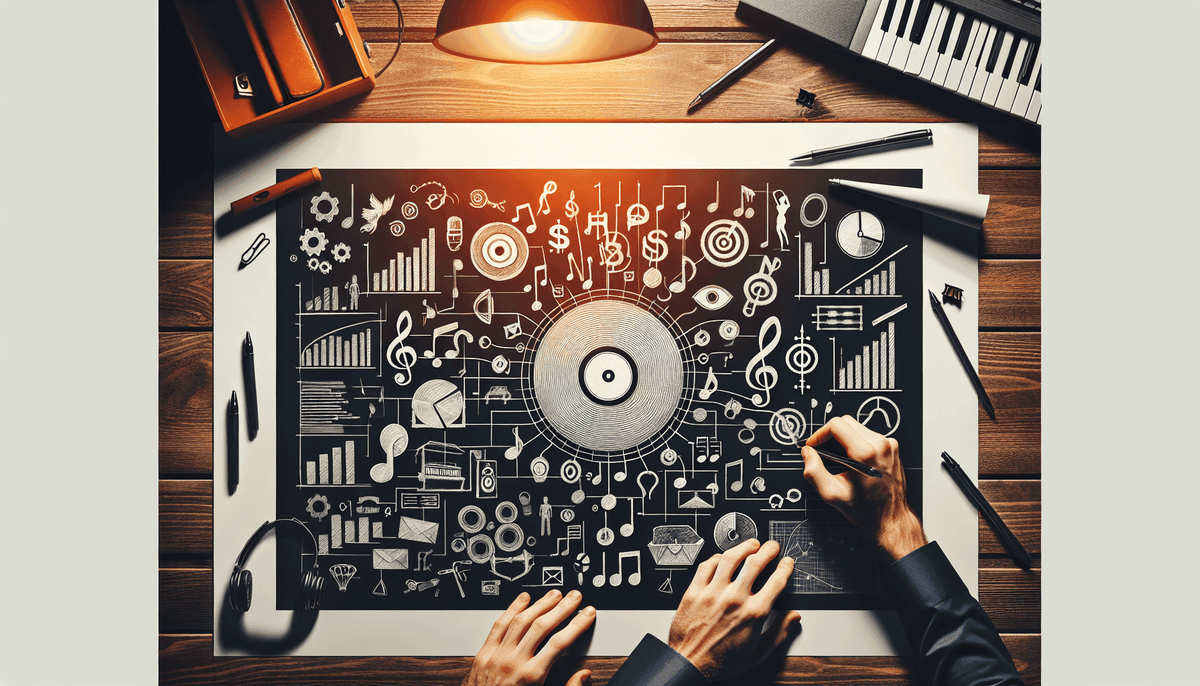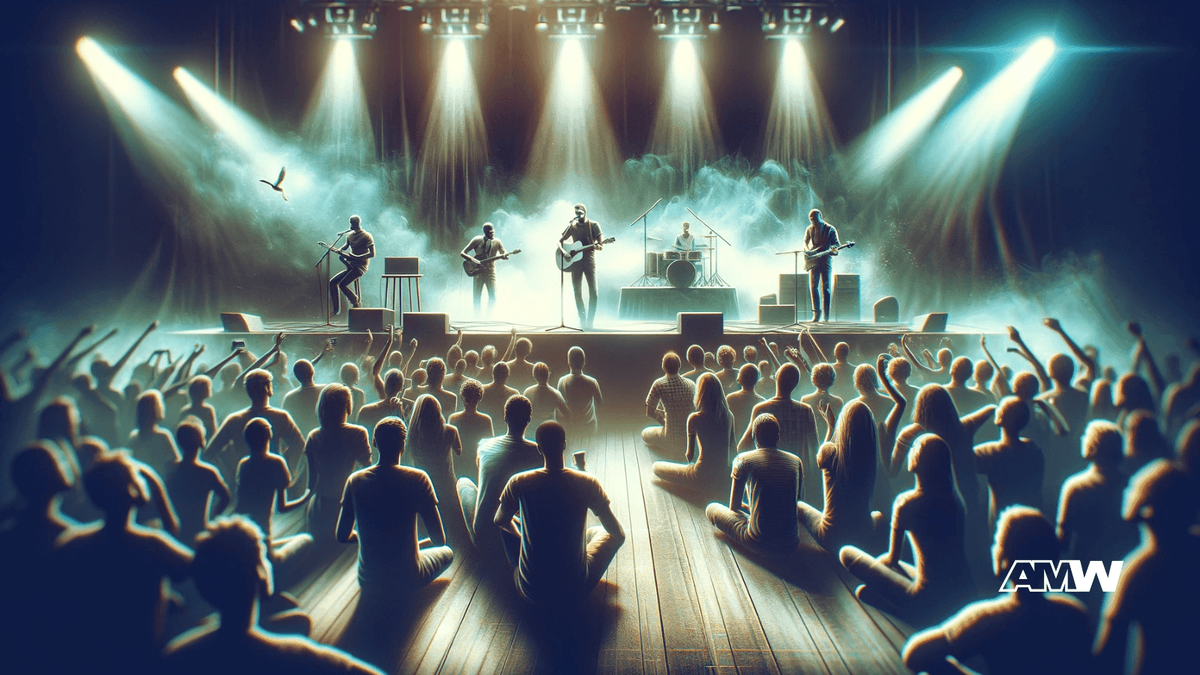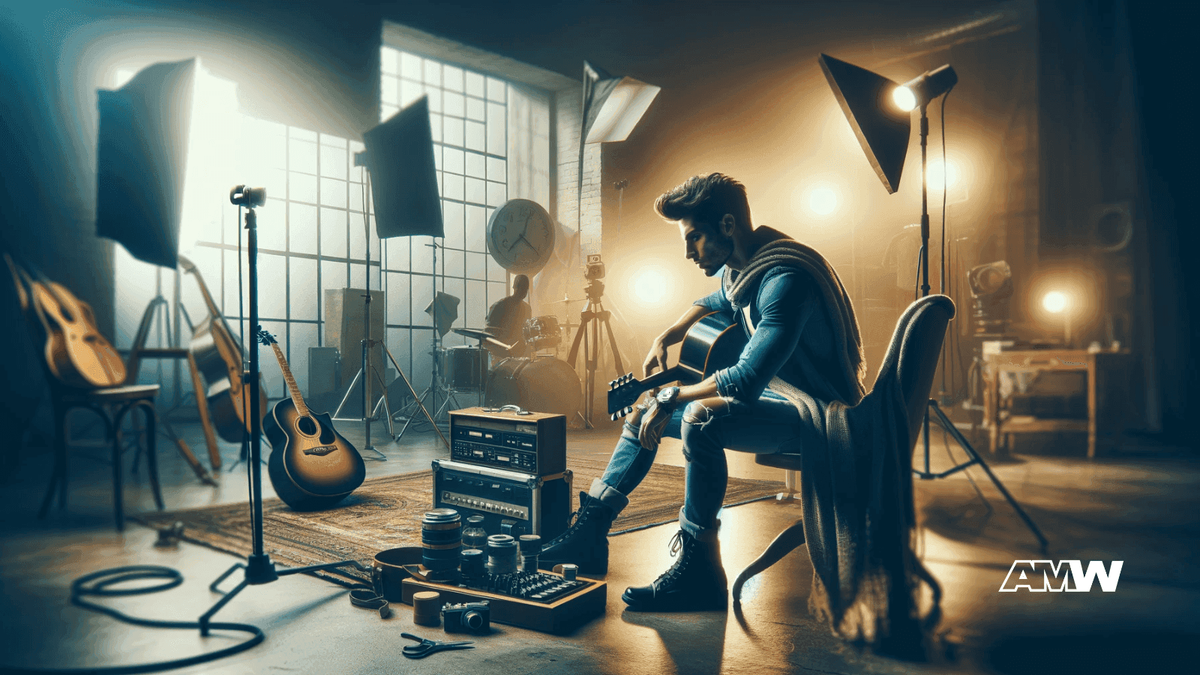Mastering Music Marketing: Essential Strategies for 2025

If you're looking for effective music marketing tactics to stand out in 2025, you've come to the right place.
Quick Summary
To succeed in the competitive music industry of 2025, artists must adopt strategic marketing techniques that include careful audience analysis, goal setting, and targeted promotions. Utilizing digital tools like engaging websites and streaming platforms is crucial for building a strong online presence. Collaboration, paid advertising, merchandising, and media relations can significantly amplify an artist's reach. By focusing on interactive and engaging content, artists can foster deeper connecti
This blog post provides practical tips for improving your music career and connecting with your audience.
Key Takeaways
- A strategic approach to music marketing enhances connection with fans through careful audience analysis, precise goal setting, and targeted promotions.
- Digital tools, including engaging websites and streaming platforms, are important for building a strong online presence and leveraging the power of music videos for visual storytelling.
- Collaborations, paid advertising, merchandising, and savvy media relations can amplify an artist's reach and strengthen their brand in the competitive music industry.
Crafting Your Music Marketing Blueprint

In the bustling music business, crafting a comprehensive marketing plan is like building a bridge that connects music artists with their fans. It's an exciting process that involves:
- Branding
- Audience analysis
- Market research
- Promotional tactics
Expanding reach and achieving goals become a breeze with a well-structured music marketing strategy, and utilizing various music marketing strategies can further enhance your success.
A promotional campaign, for instance, is more than just releasing new music and asking people to listen. Engaging content, pre-launch announcements, and post-launch activities all enhance the impact of your new releases.
So, where do we begin? Let's explore the intricacies.
Identifying Your Target Audience
Imagine you're a musician, and you've just created music that you're incredibly proud of. Now, how do you ensure that it resonates with its listeners? To find the solution, it's important to comprehend your intended audience. Understanding your fans' demographics and preferences can accelerate organic traction, while the optimal music marketing platforms can augment your reach and interaction with your ideal audience.
Musicians today can obtain demographic information from their social media accounts and other statistics.
Isn't it amazing to have access to such valuable insights?
Imagine having a fan avatar, a powerful tool enabling you to understand and connect with your target audience. It helps you create content that truly resonates with them and fosters a loyal fan base.
Setting Achievable Goals
Although pinpointing your target audience is vital, establishing well-defined goals for your music marketing initiatives is equally important. Remember, a journey without a destination is merely wandering. Setting clear goals helps structure your marketing efforts, allowing you to reach them efficiently.
Whether it's increasing your performance repertoire, learning a new instrument, or developing a solid marketing plan, having achievable goals in music marketing can lead to significant progress. Moreover, having multiple goals when releasing and streaming music is a great way to build your reputation and expand your fan base over time.
A skilled music marketer can help you set and achieve these goals, ensuring your music reaches the right audience and gains the traction it deserves.
Budgeting for Success
While having a clearly defined target audience and well-set goals is great, a key question lingers: how do we fund our marketing endeavors?
Budgeting for success involves allocating resources wisely to maximize the impact of your marketing strategies.
One key step to creating an effective budget is gaining valuable insights into your audience through analytics. By understanding where and how your audience consumes music, you can utilize effective targeted advertising strategies - like pay-per-click, boosted social media posts, and engaging specialists for larger campaigns - to connect with listeners who are highly likely to enjoy your music.
The Artist's Digital Toolkit

An artist's toolkit extends far beyond their musical instruments. Building an online presence and connecting with fans is vital; streaming platforms and artist websites can help achieve this. Tools for music promotion enable fans to pre-save or pre-add songs to their streaming platforms so they can immediately access new releases, ensuring your music reaches a wide audience right from the start.
One key tool in an artist's digital toolkit is a press kit. A press kit compiles essential information about the artist, making it a powerful tool to attract industry attention and effectively market music. Shall we further investigate these indispensable digital tools?
Leveraging Streaming Platforms
Leveraging streaming services like Spotify and Apple Music is a great way to connect with new listeners and earn revenue. By getting your music into playlists on these platforms, you can significantly increase your exposure and lead to more revenue through increased streams.
Services like Spotify Canvas allow artists to include a visual addition to their tracks. This captivating feature can boost engagement and create an immersive experience that may increase streams and profile visits.
Implementing targeted ad campaigns on the best music marketing platforms can notably enhance the exposure of an artist's music to potential fans with analogous music preferences.
Building an Effective Artist Website
An artist's website is more than just an online portfolio; it is a hub for your fans and potential fans. It solidifies your credibility as a professional and demonstrates your dedication to your craft.
The secret to an efficient artist website lies in owning your domain, optimizing your site for mobile use, incorporating a newsletter sign-up feature, and utilizing high-resolution images. You can also maximize the potential of your website for marketing purposes by incorporating local social media marketing efforts using local hashtags and geotags and fostering genuine connections with fans through an email collection system.
Visual Storytelling Through Music Videos

Music videos offer a unique way for artists to tell stories and express their creativity while promoting their music. The key elements that make a music video successful include a compelling music track, a concept or story for the visuals, and an engaging edit.
For the successful promotion of a music video on social media, artists can:
- Perfect their social media marketing strategy with proven examples and practices
- Target local customers using local hashtags and geotags
- Create captivating content that strikes a chord with their target audience
Remember, a music video is not just a promotional tool, but it also positively contributes to an artist's brand identity.
Engaging Fans with Interactive Content
In music marketing, engaging fans extends far beyond the traditional confines of simply promoting one's music.
Interactive content is powerful in digital marketing, providing a sensory-rich experience for music fans and creating a deeper connection between the brand and the audience. This approach fosters a stronger bond between fans and the artist's music. It contributes to a more favorable perception of the brand, which is critical for both indie musicians and established artists.
Such engagement can lead to a noticeable increase in sales, a growing base of loyal fans, and broader press coverage.
Interactive content in music promotion is not limited to big-name artists but is also accessible to independent musicians. These marketing campaigns utilize various elements such as social media channels, streaming services, and even artist's websites to deliver an immersive experience.
For instance, incorporating social media links into interactive content allows fans to easily share their experiences, broadening the reach of the artist's music and attracting new fans.
Platforms like Spotify playlists, YouTube channels, and even online stores can serve as venues for this interactive content. Musicians can use these platforms to market music, announce tour dates, or sell merchandise like t-shirts. Including elements such as electronic press kits (EPKs) can also provide industry professionals and music journalists with a comprehensive view of the artist's creative process and promotional efforts.
Moreover, emerging tools like email marketing campaigns, Google Ads, and collaborations with playlist curators are becoming integral in the music industry. These tools help create awareness about new song releases and play a significant role in an artist's overall marketing strategy.
Adopting interactive content as a marketing tool is revolutionizing how musicians, from indie artists to well-known names, connect with their audience. It's a dynamic approach that complements traditional marketing methods, offering music fans a more engaging and multisensory experience.
This evolution in music promotion is pivotal in building a sustainable and thriving career in the music industry.
Collaborative Growth: Networking with Other Artists
The music industry is inherently communal. Interacting with other artists can foster a robust artist community, enable cross-promotion, and potentially lead to an expanded fanbase through crossover, ultimately benefiting an artist's music career. One way to achieve this is to connect music artists, allowing them to collaborate and support each other, making their music heard by a wider audience.
When networking, artists should set clear objectives such as building a base of 25 true new fans or planning for an event to support a new album in the next 6 months. Also, collaborating with a variety of personalities, including influencers outside of the music sphere, can attract different fanbases and expand their audience in exciting ways.
Amplifying Reach with Paid Advertising
Paid advertising is an investment that can amplify your reach and increase brand awareness. The best platforms for musicians to use for paid advertising include:
- Instagram Ads
- Facebook Ads
- SubmitHub
- YouTube Advertising
Determining your advertising budget can be a challenge. Still, artists can effectively plan and allocate their advertising budget by considering services needed to accomplish goals and potential revenue streams and setting measurable objectives.
With authenticity and alignment with the music's brand, targeting local customers, and utilizing digital marketing strategies, artists can create a successful music-related digital advertising campaign.
Merchandising: Beyond the Music
Merchandising is an exciting opportunity for artists to:
- Showcase their work
- Generate additional income
- Reach a wider audience
- Attract new fans as their merchandise is worn and shared by existing fans.
Independent artists can effectively design and produce merchandise by developing a strong brand identity that appeals to their audience. And with online platforms like:
- Merchbar
- Big Cartel
- Shopify
- Bandcamp
Artists have a plethora of options for selling their merchandise online.
Utilizing Public Relations and Media Outreach
Public relations and media outreach are pivotal in music promotion through media coverage, elevating visibility among the target audience. Pitching music to media outlets is a great way for musicians to gain exposure and reach new audiences.
To effectively pitch their music, artists can identify journalists who cover their genre or new music, find their contact details, and craft personalized pitches to engage their interest. There are exciting opportunities for musicians considering hiring a publicist or PR agency for music marketing, but it requires investment and careful planning.
Live Performances and Tours as Marketing Tools

Live performances and touring present an excellent platform to engage with fans and foster your music career, and different music platforms provide essential tools for artists, managers, venues, and booking agents to promote and showcase their live events effectively.
These sites provide a variety of features to facilitate event promotion and audience engagement, including:
- Event listing and promotion
- Ticket sales and distribution
- Fan tracking and analytics
- Social media integration
- Artist profiles and bios
By utilizing social media platforms and social media sites, you can maximize your reach and connect with your audience in a meaningful way.
During live performances, artists can boost merchandise sales by offering products that are true to their brand and leave a lasting impression on fans. Planning a small local tour after the album launch can demonstrate your commitment to your release and show that you are serious about your music career.
The Role of Record Labels in Marketing
Record labels can proficiently bolster the marketing of artists and their music, thanks to their dedicated team of music marketers employing a variety of strategies such as print ads, digital ads, and social media promotion. Record labels employ Electronic Press Kits (EPKs) to effectively enhance an artist's brand profile.
Independent artists have the chance to carefully assess their marketing needs, budget, and goals before deciding if collaborating with a record label for marketing support is the best strategy for them. It's an empowering process that can lead to great opportunities.
Navigating Radio Promotion and Playlisting
Within the sphere of music marketing, radio promotions and playlisting occupy a notable position.
Independent artists can successfully land radio promotions or playlist placements by:
- Distributing their music on streaming platforms
- Signing up for artist services
- Finding their audience
- Promoting their music on social media.
Summary

To thrive in the music industry, artists need to master various facets of music marketing, from understanding their target audience, crafting a comprehensive marketing blueprint, leveraging digital tools, to building a strong brand identity.
As we step into 2025, let's use these essential strategies to amplify our music, connect with fans, and make our mark in the music world!
Frequently Asked Questions
What does a music marketing do?
A music marketing professional develops strategies to market and sell albums for a record label, working locally or regionally. This involves creating and implementing tactics to promote the label's music offerings.
What are the 4 P's of marketing music?
The 4 P's of marketing music are People, Product, Place, and Promotion, focusing on targeting the right audience, the music itself, its distribution, and promotional strategies.
What skills do you need for music marketing?
To succeed in music marketing, you need creativity, analytical skills, and excellent communication abilities to collaborate effectively with artists and industry professionals.
How to do song marketing?
To effectively market your song, you can build online relationships, organize livestreams with other artists, create unique content, start an email newsletter, play gigs, get radio promotion, and post flyers. These advice will help you expand your audience and increase the visibility of your music.
How can I effectively reach my audience?
To effectively reach your audience, it is important to understand their demographics and preferences. This can help in making content that resonates with them, and utilizing the best marketing platforms for maximum engagement and reach.